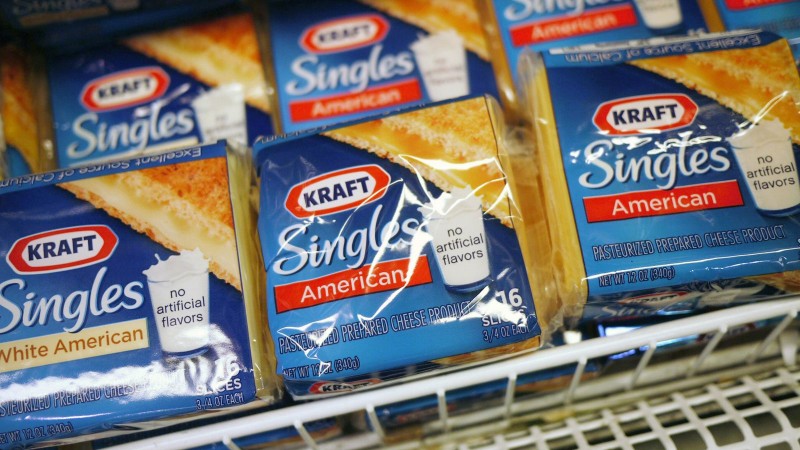 Low price and TV commercials have made processed cheese one of the most popular foods in the world. They created an image of a healthy cheese, made from natural milk and other ingredients. This image is severely distorted, studies showing that it is actually very harmful to human health.
Low price and TV commercials have made processed cheese one of the most popular foods in the world. They created an image of a healthy cheese, made from natural milk and other ingredients. This image is severely distorted, studies showing that it is actually very harmful to human health.
Processed cheese contains a lot of phosphates and other additives which prevent the calcium assimilation in the body.
Nutritionists would call this kind of cheese a bomb food that brings no benefit by consuming it. Processed cheese contains many emulsifiers, salt, water and saturated fat .
The manufacturing process is extremely simple. Cheese residues are mixed with emulsifier pests resulting in a low price product.
If you take the time to read the label of the American Cheese, for example, you will find the following ingredients:
Sodium Phosphate, for example, is an artificial emulsifier. Recent studies show that it is dangerous and affects the renal functions. “It has recently been determined that phosphate additives in food may harm the health of persons with normal renal function.
This judgment has been made on the basis of large-scale epidemiological studies and is supported by the latest findings of basic research.”(study conducted by Prof. Dr. med. Eberhard Ritz, published in Deutsches Arzteblatt International, Jan 2012).
The same study shows that patients who already have a renal disease might be affected in other ways by the intake of sodium phosphate: it states that the higher the concentration of serum phosphate, the greater the risk of cardiovascular and overall mortality.
Another ingredient widely used in the processed cheese is Milk Protein Concentrate (MPC). This is a substitute for the original dairy, used because the end product will cost less. Milk is ultra-filtered for removing all the liquid and obtain a dry substance very concentrated in protein. The process also removes all the minerals thought to be fit for a healthy nutrition.
Since the dairy industry is continuously growing, there comes the need for more MPC which became an independent substance, subject to trade and import-export. The higher the demand for MPC, the higher the need of milk. In order to increase the milk production, most farmers inject their cows with recombinant Bovine Growth Hormone (rBGH), a substance approved by the FDA.
This leads to the occurrence of the factor IGF-1, insulin-like Growth Factor. Its presence in human body is linked to increased rate of cancer (breast, prostate and colon) (Integrative Oncology Essentials, published by Brian D. Lawenda, M.D.)
The artificial dye that color the processed cheese into that bright yellow it’s called Yellow6 & Tartrazine (Yellow 5). What could be wrong with this ingredient? Yellow 5 is also approved by the FDA, with a daily intake of 5mg/kg/day.
Studies also link it to hyperactive children and worse, to severe allergic reactions, heart palpitations, feeling of suffocation, dizziness, blurred vision and even asthma (petition filed for the FDA, regarding the safety of using these additives, 3, 4)
Sorbic acid is a chemical preservative used for its antibacterial and anti fungal qualities. It prevents the occurrence of bacteria and other fungi that can affect the quality of cheese and may shorten the shelf life.
Animal studies have been made and concluded that there are no risks for the cows, dogs, cats, although it is considered irritating to skin, eyes and respiratory tract. (EFSA Journal, Scientific Opinion on the safety and efficacy of sorbic acid and potassium sorbate when used as technological additives for all animal species, published on 18 July 2014)
But what about for people?
These are quite a few of the ingredients contained by the American Cheese, sold by Kraft, Borden and other companies. Bottom line, it contains maximum 51% real cheese.
Where does this cheese come from anyway?
History says that Walter Gerber and Fritz Stettler from Switzerland first developed a type of processed cheese, in 1911, using sodium citrate. Meanwhile, in the United States, James Lewis Kraft obtained the first patent for processed cheese.
The description of the product did not include any emulsifying salts and other artificial ingredients. Over the years, it was “enriched” with other compounds that increased the shelf life, flavor and taste. All those “plastic” ingredients decreased the price, as well.
Nowadays, the manufacturing process is completely different from the one that results in the natural cheese. While the whole cheese is obtain from the milk of different mammals through fermentation, the processed one comes from melting and emulsifying a tiny portion of natural cheese which adds to some preservatives, artificial ingredients and a lot of salt.
So, in the end, what do we eat?
A lot of fat and a lot of calories, with no nutritional value. While the amount of whey decreases, the amount of fat increases. This leads to a great calorie intake. Being a food rich in fat, devoid of fiber and low in carbohydrates, it rather stimulates appetite. The high amount of saturated fats is linked to cardiovascular diseases.
A slice of processed cheese contains 6.6g fat, with 4.1g fatty acids. This represents 21% of the daily limit for one person. And this is true only if you eat processed cheese on its own.
Unfortunately, this rarely happens. Usually it is part of junk food like hamburgers, cheeseburgers, macaroni, etc. So, the intake of artificial ingredients is much higher.
Yet there is good news.
The interest in natural products increases every year and we are witnessing an explosive growth on the market of organic producers. You may choose from a lot of products without additives. Processed cheese can be replaced with a natural one, made from whole milk by conventional methods.
Try to stick to grass-fed cheese if possible.
There is also the option of replacing the animal cheese with nuts cheese which can be prepared from almonds or cashews, even at home, by yourself, using only a food processor.
It is up to you to feed your body with real food, you can make a lot of healthy choices.
Do you know cheese can cause digestive issues such as gas, bloating, diarrhea, or constipation?
If you are suffering from digestive problems, go to the next page and watch the 3 tips to reduce these digestive-related issues –
Reference:
- http://www.ncbi.nlm.nih.gov/pmc/articles/PMC3278747/, study conducted by Prof. Dr. med. Eberhard Ritz
- http://www.integrativeoncology-essentials.com/2012/07/anti-cancer-nutrition-protein-101/
- http://www.decodedscience.com/tartrazine-in-mac-and-cheese/26707
- http://www.fda.gov/ohrms/dockets/dailys/01/Aug01/081301/cp00001.pdf
- http://www.efsa.europa.eu/en/efsajournal/pub/3792.htm
About the Author:
Emma Deangela is the best selling author of The Alkaline Diet Program and 80/20 Fat Loss. She has helped over tens of thousands of men and women to lose weight and transform their health with sound nutrition advice.
Are you a big fan of cheese? What cheese do you eat?
Please help them by sharing this eye-opening article with each of them using any of the social media and email buttons below.


Leave a Reply to Ralph Blackburn Cancel reply